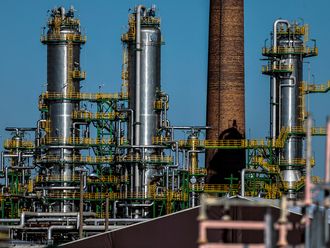Dubai: As investors grow increasingly concerned about the intensifying unrest in Hong Kong, the likelihood of the situation turning into a full-fledged crackdown remains high, along with the possibility of shutting down the city’s $4.9 trillion stock market.
One of the world’s most important trade and business hubs, the semi-autonomous Chinese city faces economic turmoil after six months of antigovernment protests and peril of the Chinese military stepping in if an uprising for democratic reforms in the city gets worse.
Hong Kong stocks have lost over $500 billion in value since the protests kicked into high gear in early June, with the main Hang Seng Index sinking 10 per cent. Shares slumped 2 per cent to a four-week low on Wednesday, piling this week’s losses to nearly 4 per cent.
“Global markets are increasingly in denial with regards to the worrying escalation in Hong Kong,” said Stéphane Barbier de la Serre, macro strategist at Makor Capital Markets. “Local markets obviously have a better grasp of the situation but complacency remains the name of the game on Western markets altogether.”
MSCI’s index of world shares edged down 0.2 per cent on Wednesday, while MSCI’s broadest index of Asia-Pacific shares outside Japan and its gauge of emerging market shares shed nearly 1 per cent.
But the situation is turning bad to worse as Hong Kong police shot and wounded one protester on Monday, as the Chinese-ruled territory descended into rare working-hours violence in its 24th straight week of pro-democracy unrest.
“Eventually, concrete developments in Hong Kong are most likely to be not-so-friendly in the best case scenario and frankly adverse in the worst case,” Barbier de la Serre said.
“Not restricted to Hong Kong, but there the problem is more acute because, first, it is harder to see how that is not going to morph into a lose/lose situation and two, that is highly asymmetric from a risk/reward perspective.”
Moreover, the Hong Kong economy entered its first recession since the global financial crisis in the third quarter, shrinking 3.2% recent official estimates showed.
Investor nerves were however slightly soothed by reports on Wednesday that Chinese online retail titan Alibaba was given the green light to sell up to $15 billion of new shares in Hong Kong, in what could be the city’s biggest IPO in about a decade.












